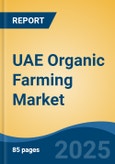Speak directly to the analyst to clarify any post sales queries you may have.
10% Free customizationThis report comes with 10% free customization, enabling you to add data that meets your specific business needs.
Supportive government regulations and initiatives have further encouraged the adoption of organic farming practices in the UAE, providing a conducive environment for the market's growth. The UAE government has played a pivotal role in nurturing and promoting the organic farming sector within the country. Through stringent regulations and certification processes, the government ensures the quality and authenticity of organic products, instilling consumer trust in the market. Moreover, the government actively supports local organic farmers and producers by providing platforms and opportunities to showcase their goods, both domestically and internationally.
Key Market Drivers
Growing Focus on Food Safety
The awareness among consumers regarding the benefits of organic food is experiencing a significant surge. In addition to being considered healthier, organic products are also seen as key contributors to environmental sustainability. Consumers are gaining a deeper understanding of the detrimental impacts of chemical pesticides used in conventional farming practices, which is leading them to embrace safer and organic alternatives. Furthermore, consumers are realizing that organic food not only promotes their own well-being but also supports the health of the planet. The adoption of organic products aligns with their desire to make more sustainable choices for a greener future.This growing awareness is fueling the demand for organic food, driving the organic farming market to new heights. In June 2022, the Abu Dhabi Agriculture and Food Safety Authority (ADAFSA) introduced a program to establish a gene bank aimed at developing innovative solutions for future food security challenges and strengthening the UAE’s food security framework. Launched in collaboration with leading national research centers, the Abu Dhabi Agricultural Genome Program seeks to implement global best practices in agricultural genetic research.
The UAE government has taken decisive actions to ensure that organic products meet stringent standards of quality and authenticity. These measures have played a crucial role in establishing consumer trust in organic food. By implementing rigorous regulations, the government has created an environment where consumers can confidently choose organic products, further bolstering the demand. The government's unwavering commitment to enhancing food safety has been a driving force behind the growth of the organic farming market. By prioritizing the well-being of its citizens, the UAE government has fostered an ecosystem where organic farming can thrive, ensuring that consumers have access to safe and nutritious food.
Key Market Challenges
Complexities Associated with Pest and Disease Management
Organic farming, despite its numerous benefits, comes with its own set of challenges. One of the most significant of these challenges is pest and disease management. Unlike conventional farming, which often relies on synthetic pesticides and chemicals to control pests and diseases, organic farming adheres to strict guidelines that prohibit the use of such substances. This can make pest and disease management more complex and challenging for organic farmers. In organic farming, pest and disease management involves finding alternative methods to control these threats. This includes the use of biological control agents, crop rotation, and the cultivation of resistant crop varieties. While these methods are effective, they require a deep understanding of ecological systems and can be difficult to implement.and production efficiency, making it difficult for UAE organic farms to compete with conventional agriculture.
Key Market Trends
Growing Focus on Greenhouses and Controlled Environment Agriculture
Greenhouses and Controlled Environment Agriculture (CEA) techniques are gaining tremendous popularity in the UAE's organic farming sector. CEA, also known as indoor farming, involves cultivating plants in controlled environments where factors like temperature, humidity, light, and nutrient levels can be precisely managed. This approach ensures optimal growing conditions and allows for the year-round production of organic crops, irrespective of the unpredictable outdoor weather conditions. With CEA, farmers can create a perfect environment for plants, resulting in higher yields, superior quality produce, and a consistent supply of fresh, local, and organic fruits and vegetables.The increasing consumer demand for toxin-free and organic food is driving the exponential growth of the UAE organic farming market. With the adoption of greenhouses and CEA techniques, farmers can meet this demand by cultivating organic crops without relying on synthetic pesticides and fertilizers. By eliminating the use of harmful chemicals, these farming methods contribute to healthier food options and support the overall well-being of individuals. This not only satisfies the discerning preferences of health-conscious consumers but also aligns with global efforts to promote sustainable and eco-friendly agricultural practices.
Key Market Players
- Emirates Bio Farm
- Saif Al Shamsi of the Bufjair Trading Company (BTC)
- Wafra Farms
- Pure Harvest Smart Farms Ltd.
- Green Heart Organic Farms
Report Scope:
In this report, the UAE Organic Farming Market has been segmented into the following categories, in addition to the industry trends which have also been detailed below:UAE Organic Farming Market, By Crop Type:
- Fruits & Vegetables
- Herbs
- Organic Eggs
- Others
UAE Organic Farming Market, By Method:
- Crop Rotation
- Polyculture
- Mulching
- Cutting
- Composting
- Weed Management
- Soil Management
- Others
UAE Organic Farming Market, By Region:
- Dubai
- Abu Dhabi
- Sharjah
- Rest of UAE
Competitive Landscape
Company Profiles: Detailed analysis of the major companies present in the UAE Organic Farming Market.Available Customizations:
With the given market data, the publisher offers customizations according to a company's specific needs. The following customization options are available for the report.Company Information
- Detailed analysis and profiling of additional market players (up to five).
This product will be delivered within 1-3 business days.
Table of Contents
Companies Mentioned
- Emirates Bio Farm
- Saif Al Shamsi of the Bufjair Trading Company (BTC)
- Wafra Farms
- Pure Harvest Smart Farms Ltd.
- Green Heart Organic Farms








